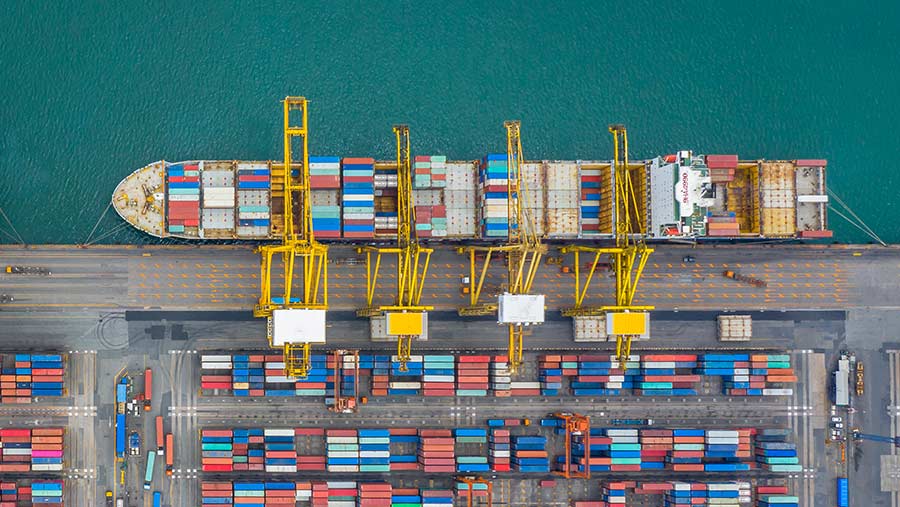Outlook 2020: Global economic downturn will hit the UK
 © Ingram Image
© Ingram Image Whatever the outcome of Brexit, the UK economy faces tougher economic conditions that will affect farm businesses next year.
The International Monetary Fund and the Organisation for Economic Cooperation and Development, both predict a global economic slowdown in 2020, with the OECD forecasting the slowest growth since the 2007-08 financial crisis.
“When the world economy is sick, the UK becomes infected too,” Andersons partner Graham Redman warns.
See also: Clock ticking on £35m diversification grant scheme
Key points for 2020
- Expected global economic downturn will affect the UK economy and agriculture is not immune
- Weaker sterling could benefit farmers, especially for exports, although costs are still rising
- Much depends on how the outcome of Brexit affects international trade and currencies
Trade conflict between the world’s two largest economies – China and the USA – is a growing issue, as they become further embroiled in a protectionist wall-building programme, slowing trade and jeopardising opportunities.
“Chinese growth has fallen to its lowest in nearly three decades, and US base rates have decreased as the Federal Reserve braces for a contraction.”
Closer to home, the European Central Bank assures it is prepared for an economic downturn in the Eurozone. However, rates are already extremely low and cannot fall much further, Mr Redman says.
“Eurozone growth is relatively static, which is partly due to the UK’s decision to leave the trading block.”
Whichever way Brexit goes, experts predict a year of slow or, more likely, negative UK growth during 2020, with property prices also expected to decline.
Adding to the financial pressure is a forecast rise in inflation, possibly to 4% with a Brexit deal, or maybe higher if Sterling weakens further; such as under a ‘no-deal’ scenario.
Mr Redman notes that although UK employment is relatively high, productivity per worker is poor. Investment by companies is required; confidence to train employees is needed and to install tools and machines that raise the return per worker.
Market outlook 2020
Farmers Weekly gets expert insights into the markets and prices for farmers across the sectors to help with making business decisions in 2020.
Farm profitability uncertainty
The UK’s trading relationship with the EU and the rest of the world, along with future currency movements will drive agricultural profitability next year, says Andersons partner and head of business research Richard King.
“Continued uncertainty is likely to keep Sterling weak, which is generally good for farm profits.”
However, cyclical market movements, notably lower milk prices, combined with rising costs, especially labour and machinery overheads, may well negate any gains.
Total Income From Farming (TIFF) is therefore forecast to decline slightly from 2019, moving back closer to its real-term average for the last decade, assuming there is no major disruption to trade from a “cliff-edge” Brexit, and the pound stays in the €1=85-90p range.
Defra’s first official 2019 TIFF estimate will be published in the New Year, but Andersons modelling predicts a 4% increase in real terms from the provisional 2018 figure, to just below £5bn.
FW says
It’s hard to believe that we are no wiser about the future of UK farming and farm policy now than we were a year ago.
The unknowns continue to make a difficult job even more challenging.
Alongside the farming and market uncertainties associated with Brexit, many businesses which import parts and other supplies for agriculture had to bear the heavy costs of stocking up in anticipation of the UK’s exit from the EU, only to see the deadline pass twice with a devastating effect on their cash flow.
Food and drink exporters had to take a view on production volumes as these deadlines approached and then passed. All of this adds to the strain on rural businesses, often already disadvantaged by poor communication and transport links.
The impacts of the horrendously wet autumn and the flooding it brought in many areas will be widespread.
Not only do these events impose a heavy cost in immediate financial terms, but they take a huge toll on the health and wellbeing of rural communities, adding to stress levels that were already high.
The imposition in October by US president Donald Trump of a 25% tax on EU dairy, wool and other food exports to the US, is a further blow and raises the strain on rural businesses and jobs.
Unfortunately, it may be an indication of some of the heavy trade weather the UK will have to negotiate in the next few years.
